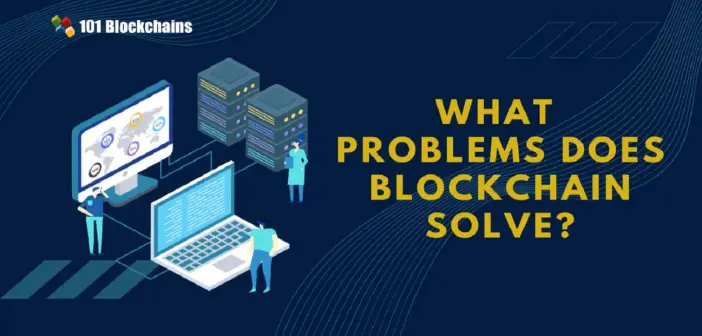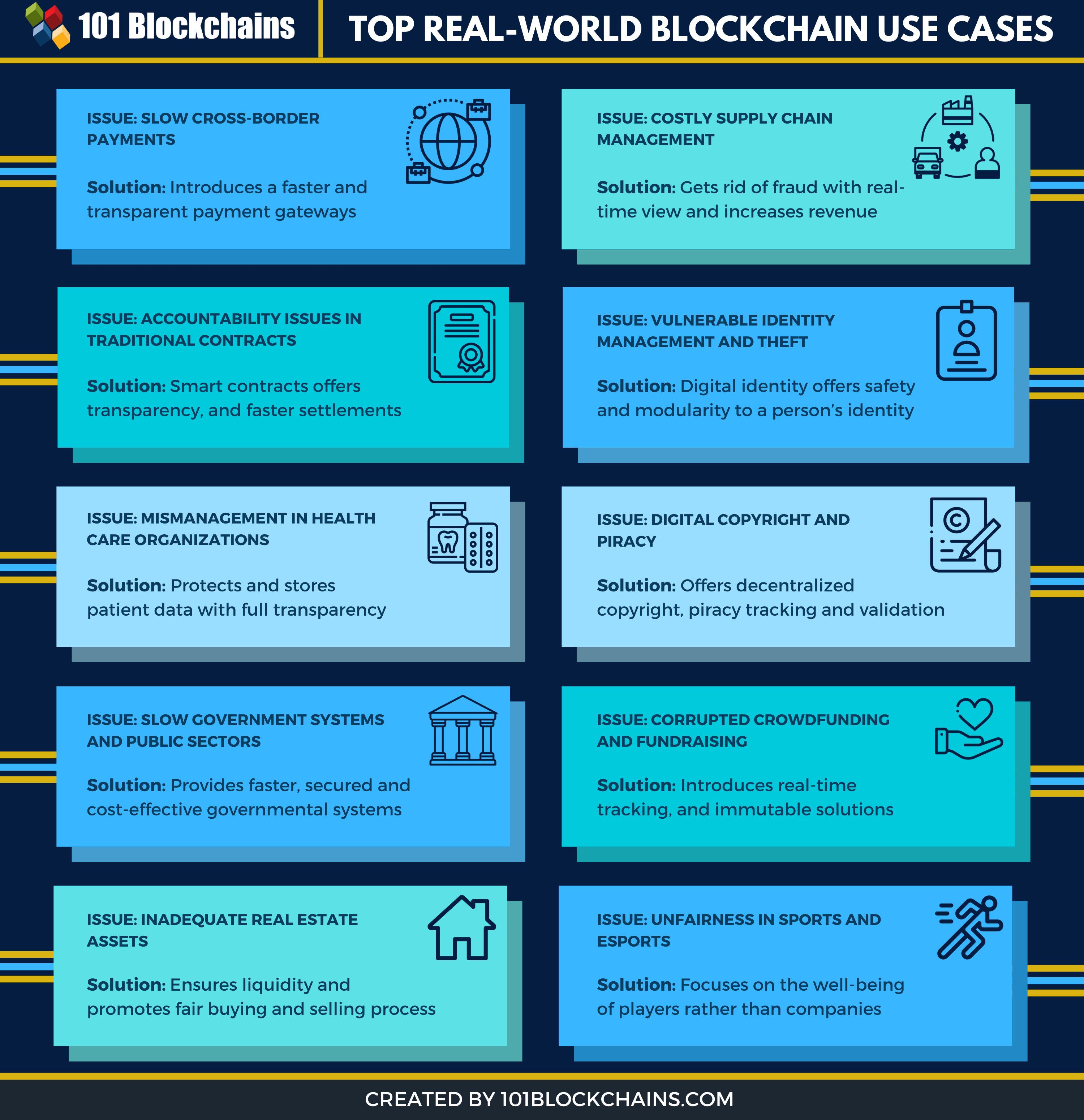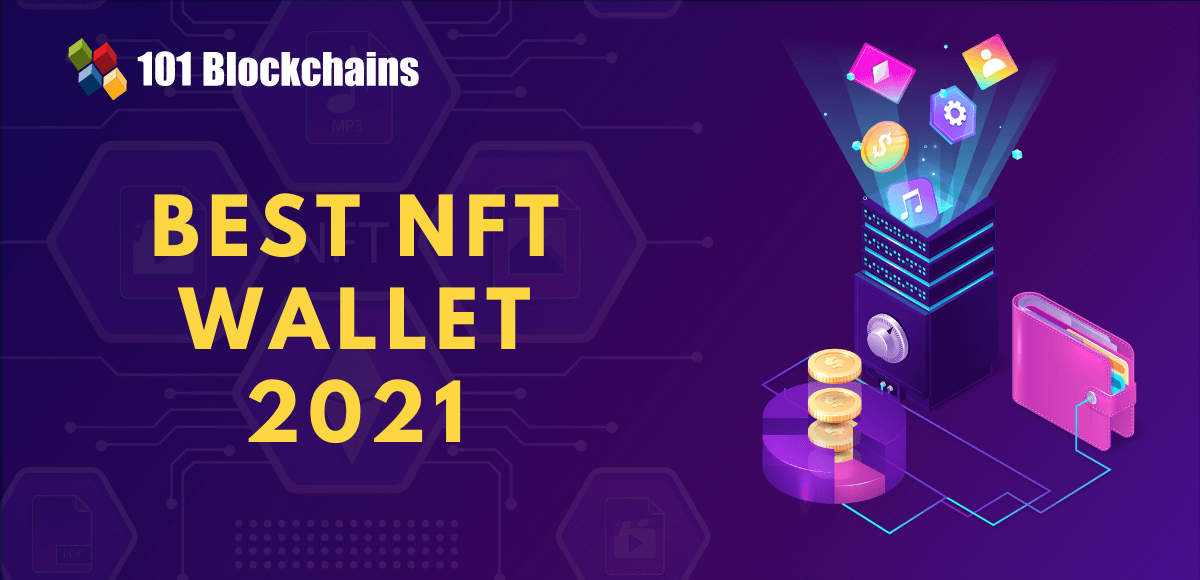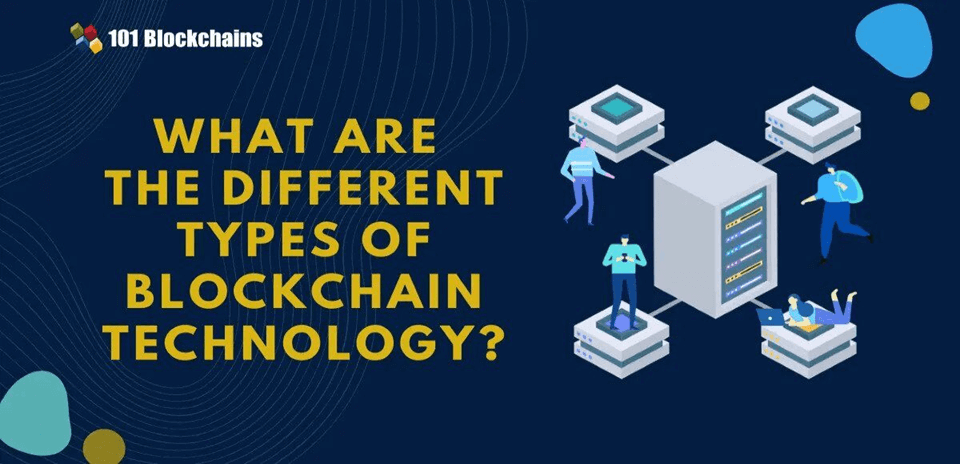Learn how blockchain truly works, master key definitions, and uncover what makes smart contracts so "smart." Dive into the fundamentals, gain valuable insights, and start your blockchain journey today!

- Reviews
Gwyneth Iredale
- on January 05, 2021
What Problems Does Blockchain Solve?
Blockchain can solve a lot of real world problems and offer a better business model and economic structure for all of us. Let’s explore these problems and the possible solutions that blockchain offers.
We are most used to hearing about blockchain together with Bitcoin and Cryptocurrency. However, its application goes far beyond the likes of digital assets. In fact, blockchain is by far, one of the most disruptive and revolutionary technologies of our time.
According to reports, global spending on blockchain is estimated to go up and is expected to cross $15.9 billion by 2023.
Furthermore, almost every single industrial section is looking to adopt blockchain technology and reap its benefits. This starts for the expected fintech companies, to even the media industries and health care.
So, what makes blockchain this massive force to be reckoned with? Well, for the purpose of this read, we have put together a list covering some of the real world problems and how blockchain offers effective and efficient solutions. More so, we will also know what is the core problem blockchain trying to solve?
Build your identity as a certified blockchain expert with 101 Blockchains’ Blockchain Certifications designed to provide enhanced career prospects.
Problems That Blockchain Solve: What is Blockchain?
As the name might have you thinking, Blockchain is nothing more than a chain of blocks – well, theoretically at least. The “blocks” here represent digital information that is linked or “chained” to other blocks using a cryptographic hash of the previous block.
This unique structure makes it super secure and resilient to any sort of data modification, and this is where most of its application lies.
First and foremost, you must take into account that there is no central authority governing blockchain. This makes it a completely democratized system. Next, since the provided information is immutable, it can be easily shared and made open to the public allowing for unparalleled levels of transparency.
These two factors make blockchain literally the next biggest thing since the coming of the internet. But what problems does blockchain solve, making it so popular and groundbreaking?
Well, here are a few examples of real world problems that blockchain solves. So without further ado, let’s get started:
Learn the fundamentals of Blockchain through Blockchain Basics Flashcards
Top 10 Real World Problems That Blockchain Solves
Now that you have a basic understanding of what blockchain is and how it works let’s quickly go over some real world problems and how this revolutionary technology can be used to solve them and offer solutions. We will also know what is the core problem blockchain trying to solve?
Please include attribution to 101blockchains.com with this graphic. <a href='https://101blockchains.com/blockchain-infographics/'> <img src='https://101blockchains.com/wp-content/uploads/2020/04/Problems-Blockchain-Solve.png' alt='Problems Blockchain Solve='0' /> </a>
1. Cross-Border Payments
The Problem: The current state of international payments through banking channels is a hotch-potch, to say the least. It is a multistep process that involves a lot of intermediaries. Furthermore, each step of the process takes a lot of time and also requires a hefty amount of money.
In fact, according to the World Bank, the average transaction fee for worldwide payments is around 7%. That’s a lot!
How Blockchain Solves the Problems
Blockchain helps streamline the entire process by cutting out any and all middlemen and lengthy procedures, thereby the burden of unnecessary time delays.
By using its secure and sophisticated distributed ledger, once a transaction gets recorded, the payment is almost instantaneously transferred to the receiving party. Since the transaction can’t be reversed or changed, it also ensures better accountability and security than the currently employed system.
According to Deloitte, for transactions made using blockchain, the involved parties incur around 40% to 80% fewer remittance fees than traditional methods. Not only that, but the entire transactions are processed and completed in a matter of 4 to 6 seconds instead of having to wait for days.
And when you include the benefits of added security and transparency into the mix, blockchain is surely a better solution for global monetary transactions.
Who Is Currently Using Blockchain For This Purpose?
Currently, a bunch of fintech companies is using blockchain to solve this problem. Notable names in the field include:
Circle: Allows users to safely transfer money (multiple supported currencies) to over 29 countries.
Ripple: Helps banks, payment providers, and digital asset exchanges to send and receive money globally, super-fast, and with minimal remittance fees.
WeTrade: WeTrade offers an innovative digital platform that enables banks and businesses to work collaboratively across Europe, offering secure, transparent, and opportunities.
2. Supply Chain Management
The Problem: Supply Chain Management refers to the planning and execution of all related processes leading to a finished product deployment. Generally, it constitutes a network of entities – individuals or businesses that start from raw material suppliers, straight to the product manufacturers, and then down to the distributors.
A well-optimized supply chain ensures maximum productivity with reduced fraudulent activity and overhead costs. As you can imagine, implementing this in the real world is a real hectic job. Automation efforts have been made using AI and Machine Learning, but blockchain promises to be a game-changer in this area. So, this is one of the real world problems solved by blockchain.
Want to know how blockchain impact enterprise supply chain operations? Enroll Now: Enterprise Blockchains and Supply Chain Management Course
How Blockchain Solves the Problems
One of the key benefits that blockchain brings to Supply Chain Management would be interoperability.
The transparency in data sharing makes sure that everyone is on the same page – starting from the manufacturers to retailers, vendors, and even the contractors. In turn, this helps to reduce any conflict and delay in operations.
Furthermore, since all the products can be tracked in real-time, it reduces the risks of misplacement or goods getting stuck in the supply chain.
And if that’s not all, blockchain offers scalability at unimaginable levels, with large databases being available from multiple locations throughout the world. This means no matter how big your business is or how spread across the globe it is, using blockchain, you will be able to manage your supply chain effortlessly.
Who Is Currently Using Blockchain For This Purpose?
A few examples of companies using blockchain for efficient supply chain management are:
Origintrail: They offer a data exchange protocol that can be used by interconnected supply chains.-
Openport: A Blockchain platform directly connects shippers and carriers, which reduces cost and optimizes supply chain management.
Walmart: Walmart, one of the biggest retail shops, are utilizing blockchain to improve its supply chain.
Not sure how to build your career in enterprise blockchains? Enroll Now in How to Build Your Career in Enterprise Blockchains Course
3. Accountability Issues With Traditional Contracts and Agreements
The Problem: At its core, we create contracts and agreements because there is a lack of trust amongst the transacting parties. As a result, we go through this legal procedure of creating contracts, a multistep process involving even more parties and tons and tons of paperwork.
As a result, a lot of time and money are spent on the intermediaries. Just imagine the last time you created a contract and how much money you had to pay your lawyer for creating all those regulatory paperwork, or how much time you spent driving up and downtown to gather all the signatures.
Even though we take this as the norm and a part of creating contracts and agreements, all these inconveniences can be avoided by leveraging blockchain technology, specifically smart contracts.
So, this is one of the real world problems solved by blockchain.
How Blockchain Solves the Problems
Well, blockchains allow for something known as Smart Contracts, an ingenious solution and future replacement for traditional contracts and agreements. So the next obvious question would be, what is a smart contract?
Well, a smart contract is basically a few lines of codes that you can store on a Blockchain. These are programmed to execute certain actions – ideally, process a transaction as soon as the terms and conditions specified in the lines of code are met.
Now, since the smart contracts are stored on the blockchain, the terms and conditions can’t be altered or manipulated. Furthermore, everything is open and publicly available, allowing for greater transparency.
Who Is Currently Using Blockchain For This Purpose?
There are tons of startups and companies that have already adopted smart contracts in exchange for traditional agreements. Here are a few notable mentions:
Tradelanse: It helps digitize the supply chain by easing agreements and traditional contracts.
Tradeix: Tradeix is rewriting working capital finance and trade using blockchain. They provide value for alternative funders, banks, value-added providers, and so on!
Curious to understand the complete smart contract development lifecycle? Join the Standard & Premium Plans and get free access to the Smart Contracts Development Course Now!
4. Identity Theft
The Problem: At its core, your identity is nothing more than a collection of claims regarding you as a person. This includes data on where you live, your passport number, driving license, social security number, and so on. All these are data points that are used by governments and stored in centralized databases.
A bad actor can potentially get hold of one of these documents, and exploiting certain security flaws, steals your identity. They can now use your identity to gain some financial advantage or obtain credit in your name. This is a serious problem! In fact, many criminals also steal a dead person’s identity to commit crimes and get away with it. So, this is one of the real world problems solved by blockchain.
How Blockchain Solves the Problems
Blockchain offers a novel solution to the problem. In a decentralized platform, you get access to a private key and a public key. The public key is made available to the public.
And because of the open, transparent nature of blockchain, everyone can access your public records. However, it offers concrete security as no one can change or edit your data.
Now in case, you want to access your personal data or provide authorization, you can use your private key to verify your identity. It is a simple method but provides a lot of security over restricted identity theft as it is carried out today.
Who Is Currently Using Blockchain For This Purpose?
A ton of new Blockchain startups has popped up revolving around identity management. Here a few notable ones:
Validate ID: The company uses Blockchain technology to provide digital identity solutions, including a comprehensive electronic signature service. Their service strives to provide simple and cost-effective services that also offer high-class security.
NewBanking: NewBanking allows users to share their identities over the web without worrying about losing or sacrificing their sensitive data.
Sovrin: Sovrin is offering the world’s first self-sovereign identity(SSI) network.
Uport: Uport lets the business build a trusted ecosystem and offer the customers and partners a way to transact securely.
Want to understand the concept of decentralized identity in detail? Enroll now Decentralized Identity Fundamentals Course
5. Managing And Protecting Patient Data in Health Care Organizations
The Problem: The current healthcare systems use centralized systems to record and manage patient data. These can be less secure and subject to misinformation.
There have been numerous cases of data breaches in hospitals where patient data like credit card information and genomic testing records were stolen. In fact, between the span of 2009 to 2017, over 176 million patient records were compromised because of data breaches.
Furthermore, the current state of interhospital communication of patient data is a complete mess. Many times patients choose to switch hospitals. Sometimes, because of emergencies, they are admitted to hospitals in a different network.
Now, since the current system doesn’t facilitate quick and easy exchange of patient records from their primary care provider, they are now forced to create a new medical record, which is a loss of time as well as money.
How Blockchain Solves the Problems
Blockchain can help create a decentralized log of patient data that is transparent and public for all hospitals to access. Furthermore, there is no way to corrupt the data, so the entire problem of interhospital communication is resolved.
Next comes security. Despite being transparent and public, blockchain can also help keep your data private by concealing your identity with secure codes that will protect all your sensitive data. If and even necessary, you need to provide a private key, and only then will the information be accessible.
Who Is Currently Using Blockchain For This Purpose?
Many companies adopt blockchain in the health sector to provide better management and security for patient data. Here are a couple of notable names:
BurstIQ: The company provides Blockchain solutions to help healthcare companies manage massive amounts of patient data securely and safely.
MedicalChain: Helps maintain the integrity of health records. Doctors, hospitals, and laboratories can request patient information, but the patient identity remains safe and protected from outside sources.
6. Digital Copyright And Piracy
The Problem: Did you know that the US film and TV industry incur a loss of around $71 billion per year because of copyright infringement? Big media houses like Sony and others are constantly fighting legal wars against piracy and the illegal distribution of media.
But why are these industries suffering so much?
Well, you would be amazed to learn that media industries, specifically the music industry, still hold on to legacy systems and business models that were relevant back when the hard-copy format was popular. The system is not adept in the world of the internet.
This is why a few select players have embraced that digitization trend and are currently dominating the streaming market.
How Blockchain Solves the Problems
Blockchain can help artists and creators digitize the metadata of their content like timestamps and IP (Intellectual Property) rights in immutable ledgers.
Now, the creator can safely put their content on a publicly open market but immediately knows once a copyright infringement occurs, and thus, take legal proceedings.
Furthermore, the blockchain can record every time the content gets accessed or used. This creates a sort of transparent real-time tracking, which also opens the possibility for consumption-based pricing mechanisms, which will be better for the consumer.
As far as transactions are concerned, smart contracts can be set up to provide micropayment facilities between the consumer and the creator.
Who Is Currently Using Blockchain For This Purpose?
One of the most prominent names in the industry actively involved in the idea of blockchain for DRM would be Sony.
Start your Blockchain Developer Learning Path today and become a Blockchain Developer!
7. Government Systems And Public Sectors
The Problem: Most of the local governments and public sectors worldwide rely on age-old methods and systems for all their processes, which are slow, expensive, and make room for corruption.
For example, internal data breaches can render sensitive data about governments at high risk. Then there is the case for the labor-intensive processes, which take up a lot of time and also increase the cost.
Furthermore, being a centralized system, it makes room for a lot of abuse and corruption from the inside. This can result in increased distrust between the government and its people, which typically translates to even more problems in the state.
How Blockchain Solves the Problems
First of all, Blockchain-based government models allow businesses, governments, and individuals to securely share resources within the distributed ledger with complete peace of mind. Since the structure is immutable, you don’t need to worry about fraud or data manipulation.
Secondly, following the decentralized nature of blockchain, it makes government operations more transparent, thereby reinforcing the people’s trust in the system.
Finally, using smart contracts, many labor-intensive tasks can be automated, which can streamline the process, helping reduce time and cost.
Who Is Currently Using Blockchain For This Purpose?
Dubai is going to be one of the first cities in the world to implement the blockchain policy. This will enable their government to facilitate transactions using blockchain, wherever possible.
8. Crowdfunding and Fundraising
The Problem: Crowdfunding is becoming more and more popular as businesses and startups can easily raise funds in a relatively inexpensive and uncomplicated manner. It has also been and still is the primary form of fundraising for non-profit organizations.
But with that being said, Crowdfunding platforms are plagued with a slew of problems starting from investor abuse, security concerns, and even illegal transactions. All this creates fear in the minds of the investors, driving them away from crowdfunding platforms.
As such, both the organizations, as well as the investors, are facing problems because of how things are run currently.
How Blockchain Solves the Problems
Blockchain-based systems allow for securities or Initial crowdfunding. In essence, it is similar to public offerings where a company or startup will issue tokens that will function as the company’s share, but without equity exchange.
A user can buy the tokens using fiat currencies like USD and thereby support the startup or company.
Who Is Currently Using Blockchain For This Purpose?
Up until now, literally, hundreds of companies have used securities for their fundraising needs. Petro is by far the most successful of the bunch, accumulating over $5 billion in its campaign.
9. Real Estate
The Problem: The current state of the real estate market is a complex mess. For example, if you are planning to buy a new home, then simply having the money to purchase the land is not enough.
It is a long and tedious process that is going to involve a lot of paperwork, background checks, and lots of intermediaries. Needless to say, this is going to require more money, but it is also a stressful process that will eat up a lot of your time.
And then there is the fear of seller fraud – where someone sells a property that isn’t theirs, to begin with.
How Blockchain Solves The Problems
Well, you can digitize your property and real estate assets and store them in a blockchain. This makes it immutable, so it can’t be tampered with. Furthermore, each succeeding transaction gets stored for future references.
All this makes it impossible for a person to cheat and sell your property that isn’t theirs. Similarly, once you own a property, it is recorded right there in the blockchain and can’t be altered or denied.
Furthermore, with the decentralized nature of blockchain coupled with the use of smart contracts, you can automate most of the time-consuming legalities and streamline the entire process.
Want to understand blockchain architecture advanced concepts such as development? Enroll Now: Certified Enterprise Blockchain Architect (CEBA)
Who Is Currently Using Blockchain For This Purpose?
Currently, a lot of startups and companies are leveraging blockchain to revolutionize the real estate marketplace. A few examples include:
Propy: They are one of the first companies to introduce the use of smart contracts in buying and selling real estate. The first transaction made using their system was a $60,000 apartment in Ukraine.
PropertyClub: It is a NewYork-based startup that offers a blockchain-powered platform where people can buy, sell, and invest in real estate properties by leveraging smart contracts.
10. Sports and ESports
The Problem: The sports and esports industry follows an old-school approach for generating revenue. This involves creating campaigns to sell event tickets, creating channel subscriptions to show a live game, and so on.
Although the model is working, it is not optimized. For example, it doesn’t incentivize the viewers for their engagement, which can drive more attention to sports and esports. Furthermore, crowdfunding is a bit rare in this industry but holds immense promise for enabling athletes to generate performance-based income.
All these issues can be easily resolved by introducing blockchain into the market.
How Blockchain Solves the Problems
Well, first of all, blockchain can be used to create new revenue models by tokenizing teams and introducing loyalty programs. It also allows for creating new markets where people can start betting on their favorite teams.
Similarly, individual athletes can create crowdfunding options by leveraging smart contracts to start earning money to deliver better performance.
A blockchain-based system can even help track user engagement and interaction, which can then be used to create incentive programs to promote even more audience interaction and engagement.
Who Is Currently Using Blockchain For This Purpose?
A bunch of companies and startups are starting to implement blockchain to help revolutionize the future of sports and esports. A few honorable mentions would be:
SportyCo: The company offers crypto sponsorships for athletes.
PlayerTokens: The company helps to tokenize players to promote fan participation.
Start learning Blockchain with the world’s first Blockchain Expert Career Path and become a Blockchain Expert!
Wrapping Up
So, this was our quick look at some of the present-day problems in different industry sectors and how Blockchain technology can help to solve these issues. We have also included a few mentions of current companies and startups who are adopting the technology to pave the way for the future.
We hope that this read has helped you develop a better understanding and appreciation for blockchain. However, if you still have some questions regarding some other problems that blockchain solves and how it does so, then check out our free blockchain course.






